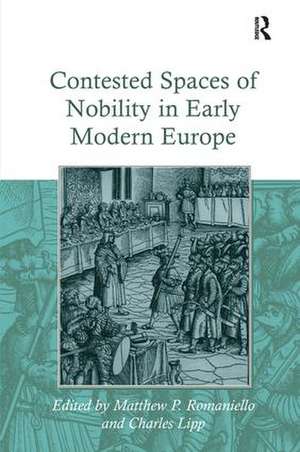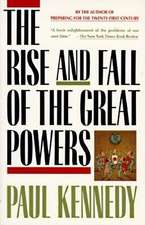Contested Spaces of Nobility in Early Modern Europe
Autor Charles Lipp Editat de Matthew P. Romanielloen Limba Engleză Hardback – 28 feb 2011
| Toate formatele și edițiile | Preț | Express |
|---|---|---|
| Paperback (1) | 262.55 lei 6-8 săpt. | |
| Taylor & Francis – 14 oct 2024 | 262.55 lei 6-8 săpt. | |
| Hardback (1) | 1054.71 lei 6-8 săpt. | |
| Taylor & Francis – 28 feb 2011 | 1054.71 lei 6-8 săpt. |
Preț: 1054.71 lei
Preț vechi: 1286.24 lei
-18% Nou
Puncte Express: 1582
Preț estimativ în valută:
201.82€ • 211.25$ • 167.98£
201.82€ • 211.25$ • 167.98£
Carte tipărită la comandă
Livrare economică 01-15 aprilie
Preluare comenzi: 021 569.72.76
Specificații
ISBN-13: 9781409405511
ISBN-10: 1409405516
Pagini: 312
Dimensiuni: 156 x 234 x 19 mm
Greutate: 0.45 kg
Ediția:1
Editura: Taylor & Francis
Colecția Routledge
Locul publicării:Oxford, United Kingdom
ISBN-10: 1409405516
Pagini: 312
Dimensiuni: 156 x 234 x 19 mm
Greutate: 0.45 kg
Ediția:1
Editura: Taylor & Francis
Colecția Routledge
Locul publicării:Oxford, United Kingdom
Public țintă
AcademicNotă biografică
Matthew P. Romaniello is an Assistant Professor in the Department of History at the University of Hawai'i at Manoa, USA. Dr Charles Lipp is an Assistant Professor in the Department of History at the University of West Georgia, USA.
Cuprins
Chapter 1 The Spaces of Nobility, Matthew P. Romaniello, Charles Lipp; Chapter 2 The Early Modern European Nobility and its Contested Historiographies, c. 1950–1980, Hamish Scott; Chapter 3 Negotiating for Agnes’ Womb, Erica Bastress-Dukehart; Chapter 4 Contested Masculinity: Noblemen and their Mistresses in Early Modern Spain, Grace E. Coolidge; Chapter 5 Inventing the Courtier in Early Sixteenth-Century Portugal, Susannah Humble Ferreira; Chapter 6 Sepulchral Monuments as a Means of Communicating Social and Political Power of Nobles in Early Modern Russia, Cornelia Soldat; Chapter 7 Il monastero nuovo: Cloistered Women of the Medici Court, Katherine L. Turner; Chapter 8 The Question of the Imprescriptibility of Nobility in Early Modern France, Elie Haddad; Chapter 9 All the King’s Men: Educational Reform and Nobility in Early Seventeenth-Century Spain, Ryan Gaston; Chapter 10 “Of polish’d pillars, or a roofe of gold”: Authority and Affluence in the English Country-House Poem, Sukanya Dasgupta; Chapter 11 Nobility as a Social and Political Dialogue: The Parisian Example, 1650–1750, Mathieu Marraud; Chapter 12 Challenging the Status Quo: Attempts to Modernize the Polish Nobility in the Later Eighteenth Century, Jerzy Lukowski; Chapter 13 Resilient Notables: Looking at the Transformation of the Ottoman Empire from the Local Level, M. Safa Saraço?lu;
Recenzii
'One of the volume's great strengths is the consistent engagement with primary documents, both archival and literary, and the essays model future directions in study of the early modern nobility ... Contested Spaces of Nobility in Early Modern Europe is highly recommended for individuals and for academic libraries ...' Sixteenth Century Journal 'Not falling into the trap of seeing noble history as a story of either resilience or decline, this volume contributes to a more nuanced picture of the successes and failures of the nobility’s different responses to a changing world.' Virtus Yearbook for the History of the Nobility 'In terms of individual essays, this collection presents interesting, and in places important, insights into early modern noble identity. There are valuable reiterations of how noble power was perpetuated and enhanced, drawing on recent methodologies.' English Historical Review '... this collection provides an invaluable resource for researchers, with a wealth of resources in the footnotes ... and potentially for teaching a course on the early modern nobility. The empirical approach and close analysis from the various authors are fresh, and a number of pertinent questions are raised which will be useful in developing this emerging subgenre of historical enquiry beyond the specific case studies presented here.' History 'The strengths... are its willingness to engage with interdisciplinary methodology, to cross national borders and build from, rather than work with, existing historiography. Likewise, the frequent reference to other chapters by authors in the book suggests a close working relationship during the creation of the volume, and that this attention to detail is replicated throughout the volume is a credit to the editors.' European History Quarterly
Descriere
European nobility faced a number of religious, political and military challenges. Many sought to increase their status, or maintain their privileges, by negotiating with various political and religious authorities, and exploiting opportunities in this era of upheaval. In examining the protective strategies nobles adopted in an age of state-building, reformation and expansion, this collection reveals the roles of the 'second order' and their ability to survive. Scholars across disciplinary and national boundaries offer exciting new perspectives on this central social group.












